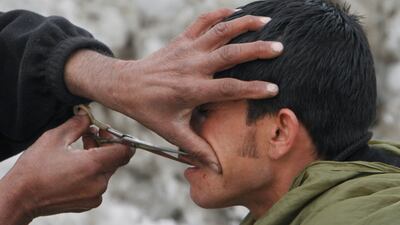Taliban morality police in Afghanistan have detained men over non-compliant hairstyles, as well as for missing mosque prayers, a UN report said on Thursday.
The report from the UN Assistance Mission in Afghanistan (Unama) found that in the first six months of enforcing new laws on personal appearance, more than half of the detentions were related to men failing to adhere to prescribed beard lengths or hairstyles. They included barbers who provided haircuts deemed to be unacceptable.
Afghanistan's de facto authorities regularly detained people arbitrarily “without due process and legal protections”, the report said.
During Ramadan, men’s attendance at mandatory prayers was also monitored closely, with some detained for missing them, it added.

More than 3,300 inspectors, mostly men, are responsible for enforcing the regulations.
Unama said men and women were detained, particularly small business owners such as barbers, hairdressers, tailors and wedding caterers, many of whom faced unemployment or loss of income because of the restrictions. The enforcement of these laws could worsen Afghanistan’s economic crisis, the report warned.
Since reclaiming power in August 2021, Taliban authorities have systematically dismantled women’s rights in Afghanistan. Girls are barred from schooling beyond the sixth grade and new vice laws issued in August prohibit women’s voices and uncovered faces in public, further erasing their presence from public life.
In a message before Eid Al Fitr, marking the end of Ramadan, Taliban leader Hibatullah Akhundzada said it was necessary to build “a society free from corruption and trials” and protect future generations from “misguided beliefs and bad morals".
Unama noted sweeping socio-economic effects in Afghanistan under the Taliban, including tighter controls on personal freedom and women’s access to public spaces, healthcare restrictions and dress code enforcement.


